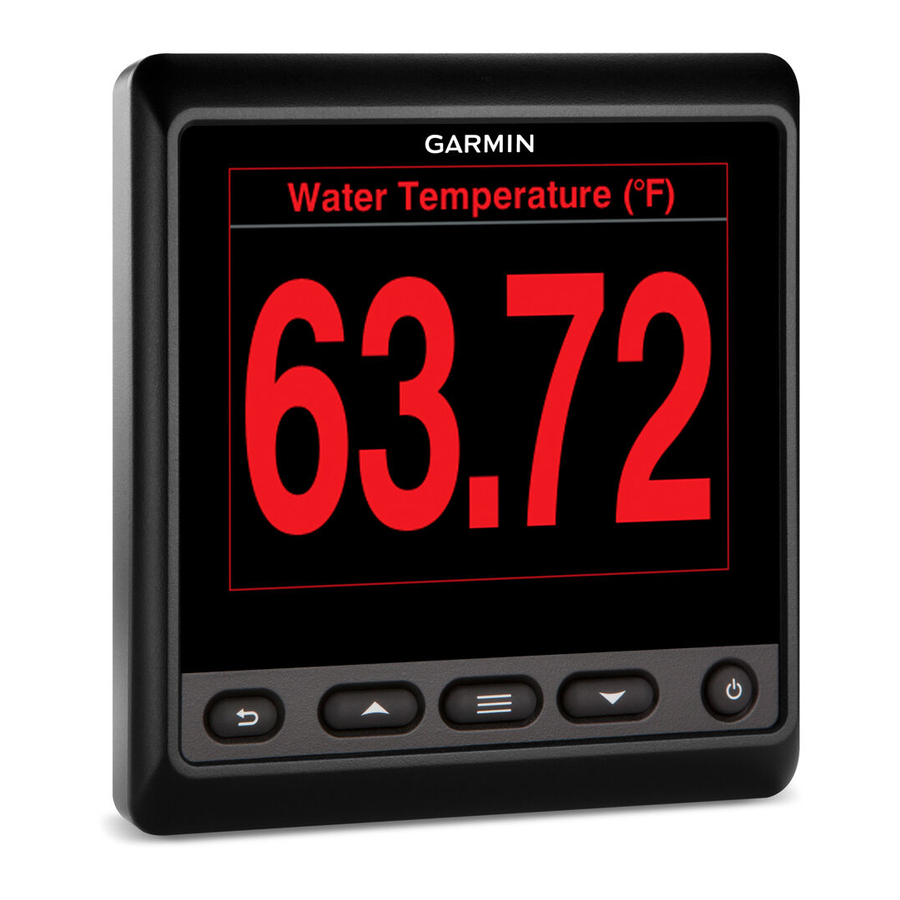Garmin GMI 20 Manuale d'uso - Pagina 7
Sfoglia online o scarica il pdf Manuale d'uso per Attrezzatura marina Garmin GMI 20. Garmin GMI 20 10. Digital marine instrument display
Anche per Garmin GMI 20: Istruzioni per l'installazione (4 pagine), Istruzioni per l'installazione (4 pagine)

Configuring the Position Format
NOTE: Do not change the position format or the map datum
unless you are using a map or chart that specifies a different
position format.
Position Format sets the position format in which a given
location reading appears. Map Datum sets the coordinate
system on which the map is structured.
1
Select
> Setup > System > Position.
2
Select an option:
• To change the position format in which a reading appears,
select Position Format.
• To change the coordinate system on which the map is
structured, select Map Datum.
Restoring System Settings to Factory Default
You can restore factory default settings for all system settings.
1
Select
> Setup > System > Factory Defaults.
2
Select Yes.
Display Settings
Select
> Setup > Display.
Color Mode: Sets the device to display day or night colors.
Configure Colors: Sets the color configuration for each color
mode. For day color mode, you can select a full color or high
contrast color configuration. For night color mode, you can
select a full color, red and black, or green and black color
configuration.
Backlight: Sets the backlight brightness.
Network Sharing: Shares color mode, color configuration, and
backlight settings with devices across the NMEA 2000
network.
Alarm Settings
Select
> System > Alarms.
Shallow Water: Sets an alarm to sound when the depth is less
than the specified value.
Deep Water: Sets an alarm to sound when the depth is greater
than the specified value.
Surface Temperature: Sets an alarm to sound when the
transducer reports a temperature that is 1.1°C (2°F) above or
below the specified temperature.
Total Fuel Onboard: Sets an alarm to sound when the fuel
remaining (based on fuel-flow information from a fuel sensor)
reaches the specified level.
Engine Status: Sets an alarm to sound when an engine
indicates there is a problem.
Apparent Wind Speed: Sets an alarm to sound when the
apparent wind speed is at, above, or below the specified
speed.
True Wind Speed: Sets an alarm to sound when the true wind
speed is at, above, or below the specified speed.
Apparent Wind Angle: Sets an alarm to sound when the
apparent wind angle is at, greater than, or less than the
specified angle.
True Wind Angle: Sets an alarm to sound when the true wind
angle is at, greater than, or less than the specified angle.
Unit Voltage: Sets an alarm to sound when the battery voltage
reaches the specified level.
Anchor Drag: Sets an alarm to sound if the boat moves a
specified distance away from the point at which the GPS
received the coordinates from where the anchor was
dropped.
Device Configuration
Total Rode Onboard: Sets an alarm to sound when the length
of rode deployed from the boat reaches a specified length.
Anchor Docking Dist.: Sets an alarm to sound when the length
of rode deployed is less than the specified length.
Viewing NMEA 2000 Settings
You can view information about NMEA 2000 devices and
change available device-specific options.
1
Select
> Setup > NMEA 2000 Devices.
2
Select an option:
• To view information about the device, such as the
software version and the serial number, select Device
List.
• To change the label of a device, select Label Devices.
NMEA 2000 Data Type Information
Each NMEA 2000 certified sensor provides unique information
to the NMEA 2000 certified display device, such as the GMI 20.
The data you can view on your display depends on the sensors
you have installed and configured. See the General NMEA 2000
Data Type Requirements topic in the Technical Reference for
Garmin NMEA 2000 Products manual at
/support.
Registering Your Device
Help us better support you by completing our online registration
today.
• Go to http://my.garmin.com.
• Keep the original sales receipt, or a photocopy, in a safe
place.
www.garmin.com
3
